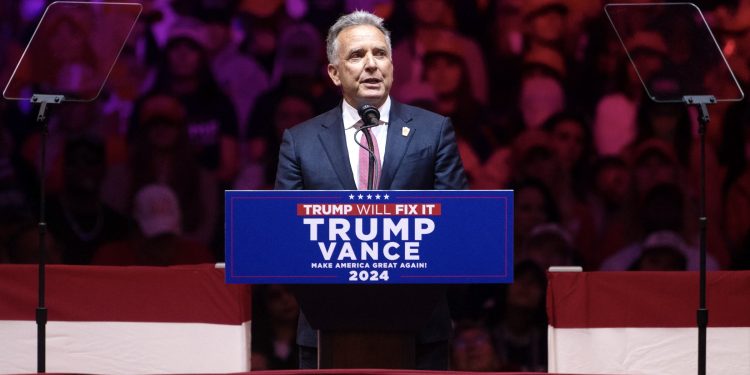Did Donald Trump succeed in obtaining a ceasefire in Gaza that Joe Biden could not obtain?
After long months of inconclusive negotiations, a ceasefire agreement between the Israeli government and Hamas appears to have finally been reached just as Biden prepares to leave office – and Trump is set to s take credit for it.
The Biden team is of course keen to point out that they spent many months conducting careful diplomacy to achieve this result. The deal itself (which still awaits final approval from the Israeli government) resembles a proposal drawn up by officials from the United States, Egypt and Qatar and announced by Biden in May.
However, there does indeed appear to be broad consensus among diplomats and officials involved that Trump-related factors played a very important role in bringing the deal to fruition – although there are conflicting accounts on the exact reasons.
Trump intervened in two main ways.
First, in early December, he publicly demanded that the hostages be released before his inauguration – and that if they didn’t, there would be “HELL TO PAY in the Middle East.” He didn’t specify what that meant, but it effectively set a deadline: Trump wanted a deal by January 20.
Second, in recent days, Trump’s team – notably new Middle East envoy Steve Witkoff – has become directly involved in the process, pressuring Israeli Prime Minister Benjamin Netanyahu to make concessions and accepts a deal.
Left-wing critics of Biden’s Israel policies have responded by saying that Trump’s interventions prove that he could have achieved a ceasefire much sooner, if only he had been willing to push Israel harder, and that he and his team were either too weak, too incompetent, or too at Israel’s mercy to do so.
Yet major developments in the war in recent months have likely also made Israel and Hamas more willing to end it.
Between September and November, Israeli forces not only killed Hamas leader Yahya Sinwar, but also drastically intensified their war against the Lebanese militant group Hezbollah, causing serious damage to the group and killing many of its leaders before a possible ceasefire in Lebanon. This likely helped Israel believe it would end the war from a position of greater strength, while leaving Hamas more isolated and ending any hope of being helped by foreign intervention.
The context of the war has therefore recently changed, paving the way for a ceasefire. But the combination of Trump’s deadline and his team’s pressure on Netanyahu does indeed appear to have been important in getting the deal across the finish line.
Major developments in the war late last year may have paved the way for a ceasefire
Since Biden endorsed the ceasefire proposal in May, there has been constant finger-pointing over who deserves the most blame for the lack of agreement on the issue.
Publicly, US officials have accused Hamas of being the “main obstacle” to no deal. This narrative has been complicated somewhat by Netanyahu’s repeated public rejections of Biden’s ceasefire proposals.
Indeed, according to Ishaan Tharoor of the Washington Post, “Arab interlocutors and U.S. officials privately have also pointed the finger at Israeli Prime Minister Benjamin Netanyahu, who has repeatedly derailed deals with new demands that Hamas does not was not prepared to accept.
From the start, Netanyahu has faced pressure from his far-right ruling partners – who have the power to remove him as prime minister – to continue the war. And it ultimately responded by launching devastating attacks against Hezbollah, which had regularly fired rockets into northern Israel since late 2023, displacing tens of thousands of Israelis from their homes. Hezbollah had said it would not stop rocket fire until the end of the war in Gaza.
Israel’s escalation in Lebanon was brutal but succeeded in dismantling Hezbollah. And meanwhile, Sinwar was found and killed in southern Gaza, giving Israel a symbolic victory in eliminating the architect of the October 7, 2023 attacks.
This placed Netanyahu in a position of strategic and political strength, which may have made him open to ending the war again. We have less information about Hamas’ decision-making, but the defeat of a key Hezbollah ally may also have made Hamas more willing to accept a negotiated settlement.
In fact, reports claimed throughout December that a ceasefire agreement was getting closer. But the two sides negotiated extensively over the details, and an agreement remained elusive.
Thus, Trump’s December 2 demand that the hostages be released before his inauguration may have been important primarily because it served as a deadline for action by two parties who were already increasingly inclined to achieve an agreement.
How important was Witkoff’s pressure on Netanyahu?

But Trump’s other major intervention came in recent days, when he sent Witkoff to the Middle East to join the negotiations and reiterated that he was very serious about the deadline – and that it applied also to Israel.
Once in Israel, Witkoff reportedly bluntly told Netanyahu that he needed to compromise more. Several reports claim that this pressure, and Trump’s involvement in general, made a difference:
- Two Arab officials told The Times of Israel that a meeting with Witkoff did more to influence Netanyahu than Biden did last year.
- An anonymous diplomat told the Washington Post that it was “the first time there was real pressure on the Israeli side to accept a deal.”
- A U.S. official told Axios that Trump’s involvement “represented the missing 10 cents on the dollar” to seal the deal.
Trump and Witkoff’s pressure on Netanyahu may also have helped the prime minister make the case to his far-right coalition partners that the deal on the table was the best he could get – even if it is not yet clear whether Netanyahu will maintain his governing coalition.
So it remains to be seen whether Trump deserves full credit for the deal, 10 percent, or something in between. But it seems indisputable that he played a useful role in the realization of this project.


